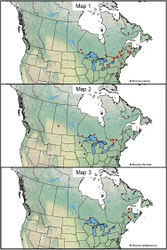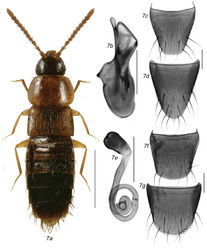Mocyta discreta
| Notice: | This page is derived from the original publication listed below, whose author(s) should always be credited. Further contributors may edit and improve the content of this page and, consequently, need to be credited as well (see page history). Any assessment of factual correctness requires a careful review of the original article as well as of subsequent contributions.
If you are uncertain whether your planned contribution is correct or not, we suggest that you use the associated discussion page instead of editing the page directly. This page should be cited as follows (rationale):
Citation formats to copy and paste
BibTeX: @article{Klimaszewski2015ZooKeys, RIS/ Endnote: TY - JOUR Wikipedia/ Citizendium: <ref name="Klimaszewski2015ZooKeys">{{Citation See also the citation download page at the journal. |
Ordo: Coleoptera
Familia: Staphylinidae
Genus: Mocyta
Name
Mocyta discreta (Casey) – Wikispecies link – Pensoft Profile
- Eurypronota discreta Casey 1894[1] [1893]: 335; Moore and Legner 1975[2]: 359 (as Acrotona). LECTOTYPE (male): USA: Ia [Iowa], Cedar Rapids, Dr. E. Brendel [in orig. description]; Eurypronota discreta Casey; Casey bequest 1925; Lectotype label designated by V.I. Gusarov, 1999, but because he never published his designation, we here formally designate this specimen as a lectotype with J. Klimaszewski’s designation label 2014 (USNM). PARALECTOTYPES: USA: Ia [Iowa], paratype 2(USNM)1 female; Ia, paratype 3(USNM)1 female; Ia, paratype 4(USNM)1 female; Ia, paratype 5(USNM)1 male; Ia, paratype 6(USNM)1 female; Ia, paratype 7(USNM)1 female; and Ia, paratype 8(USNM)1 female. All these specimens bear V.I Gusarov paralectotype labels, but because he never published his designations we here formally designate these specimens as paralectotypes with J. Klimaszewski’s designation label 2014 (USNM).
Diagnosis
Body broadly oval (Fig. 7a), length 2.4–2.8 mm; head and entire abdomen or its basal part only from brown to almost black, pronotum and basal half of abdomen in most specimens light brown, testaceous or reddish-brown, elytra yellowish to reddish-brown with some irregular small dark brown spots and darker than pronotum, legs and palps yellowish to reddish-brown and antennae either uniformly yellowish to light brown; antennal articles I-IV elongate and V-X variable in length from subquadrate to slightly elongate (Fig. 7a); pronotum transverse, usually very large but variable in width, from slightly broader than elytra to 1/7 wider [pronotum usually broader in females than in males], strongly rounded laterally, and arcuate basally; elytra transverse and shorter than pronotum; abdomen broadly arcuate laterally and with very strong macrosetae apically. MALE: median lobe of aedeagus as illustrated (Fig. 7b); tergite VIII truncate apically (Fig. 7c); sternite VIII slightly produced and rounded apically and with numerous strong macrosetae in apical part of disc, space between base of disc and antecostal suture broad, antecostal suture sinuate medially (Fig. 7d). FEMALE: spermatheca pear-shaped with small and shallow apical invagination, stem thin and straight anteriorly and coiled posteriorly (Fig. 7e); tergite and sternite VIII truncate apically (Fig. 7f, g). This species is readily recognisable from other Mocyta species by its bicoloured body, large pronotum, very strong macrosetae on the apical part of the abdomen, and antennal articles V-X subquadrate to elongate.
Distribution
This nearctic species is newly reported from Canada and the provinces of Ontario, Quebec and Saskatchewan (Map 2), and from Minnesota. Casey (1894)[1] described this species from Cedar Rapids, Iowa, USA, and no other records of this species were published from North America until now.
Natural history
In Ontario, adults were collected in forest litter, deciduous leaf mold, and maple forest from March through October. In Quebec, adults were found in maple-oak forest litter and other deciduous tree litter, from May through August. In Saskatchewan, adults were collected from deciduous forest litter in October.
New jurisdictional records
CANADA: Ontario: 7 km W Petawawa, 16.IV.1988, A. Smetana (CNC) 1 male; Chaffeys Locks, 24.X.1971, forest litter, S. Peck (CNC) 4 females, 1 male, 2 sex undetermined; Kinburn, 8.IV.1962, Acer sp., J.E.H. Martin (CNC) 3 sex undetermined; 89 mi. N. Pickle Lake, 21.VI.1973, Campbell and Parry (CNC) 1 male; South March, 19.X.1967, A. Smetana (CNC) 1 female; Merivale, 19.VI.1953, deciduous leaf mold (CNC) 1 female; Mer Bleue, 3.VIII.1973, Redner and Starr (CNC) 1 sex undetermined. Quebec: Chelsea, 8.VI.1953, E.C. Becker (CNC) 1 sex undetermined; Chelsea, 22.VIII. 1957, J.R. Vockeroth (CNC) 1 sex undetermined; Danford Lake, 30.VI.1953, Berlese deciduous duff, E.C. Becker (CNC) 1 sex undetermined; Rigaud, 15.V.1979, A. Smetana and E.C. Becker (CNC) 1 male, 3 sex undetermined; Rigaud, end Ch. de la Croix, 5.V.1988, A. and Z. Smetana (CNC) 1 female, 1 sex undetermined; 5 km W. Farrellton, Lake Bernard, 8.VII.1973, maple-oak litter, A. Davies (CNC) 2 sex ? undetermined. Saskatchewan: Saskatoon, Saskatchewan River, 52.127°N, 106.662°W, 477 m, 6.X.2008, litter sifting, deciduous, B. Godin (BGC) 3 males, 3 females.
UNITED STATES OF AMERICA: Minnesota: Ramsey Co., Lake Vadnais, 10.V.1960, soil sample (CNC) 1 male; Brainerd, 10.VI.1965, E.J. Kiteley (CNC) 1 male [new state record].
Taxon Treatment
- Klimaszewski, J; Webster, R; Bourdon, C; Pelletier, G; Godin, B; Langor, D; 2015: Review of Canadian species of the genus Mocyta Mulsant & Rey (Coleoptera, Staphylinidae, Aleocharinae), with the description of a new species and a new synonymy ZooKeys, (487): 111-139. doi
Images
|
Other References
- ↑ 1.0 1.1 Casey T (1894) Coleopterological notices. V. Annals of the New York Academy of Sciences 7: 281–606. doi: 10.1111/j.1749-6632.1893.tb55411.x
- ↑ Moore I, Legner E (1975) A catalogue of the Staphylinidae of America north of Mexico (Coleoptera). University of California, Division of Agricultural Science, Special Publication No. 3015: 1–514.

